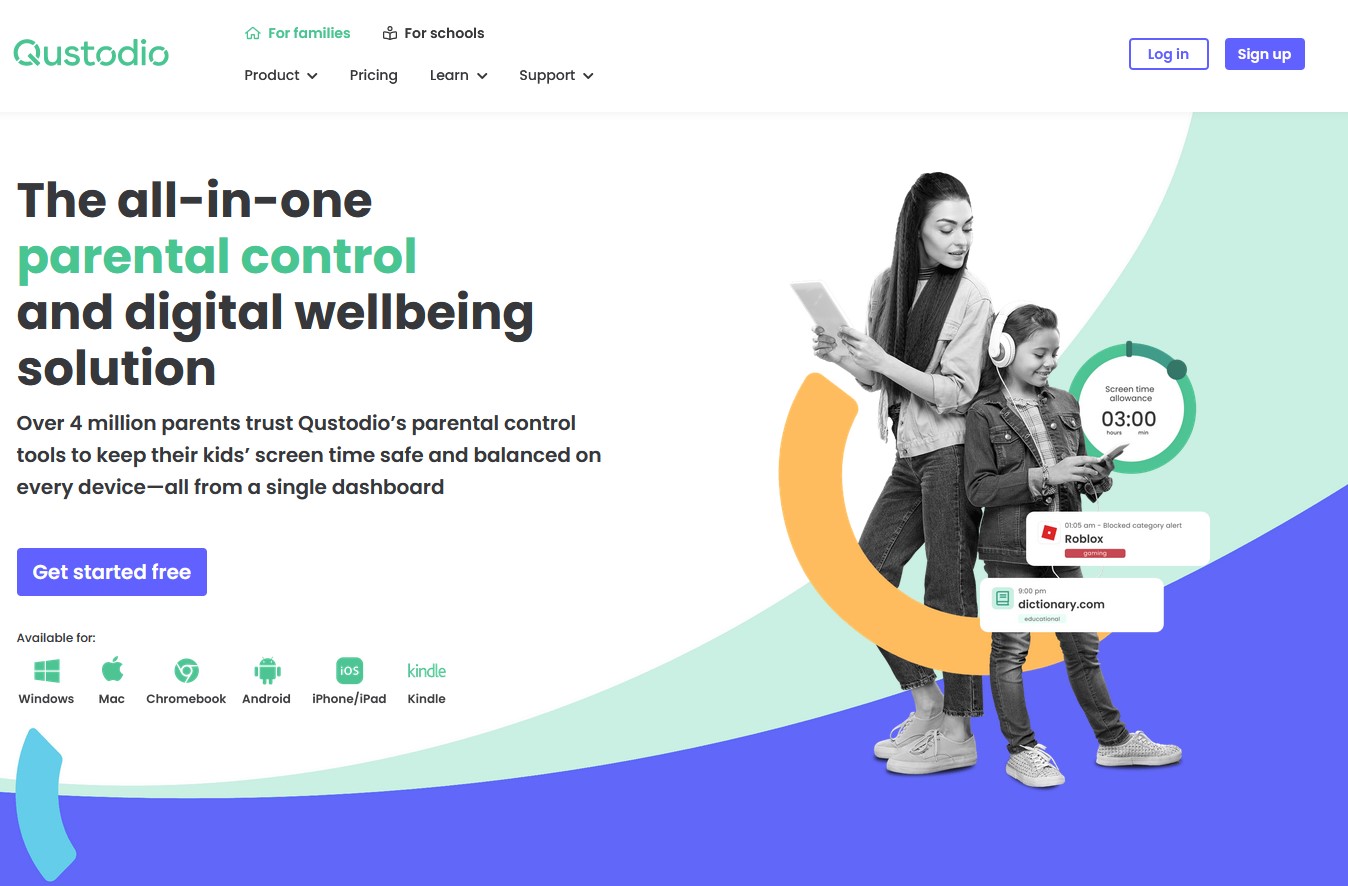TechRadar Verdict
A stellar choice – it’s packed full of features, easy to use, and relatively affordable.
Pros
- +
+Excellent filtering, scheduling and location features
- +
+Great design that’s easy to use
- +
+Loads of support available
Cons
- -
Limited social media support
- -
Some cheaper rivals
- -
More limited on iOS
Why you can trust TechRadar
If you’ve spent any time researching the best parental control apps, then you will have heard of Qustodio – it’s one of the most prominent names in the sector. It’s been around for over a decade, it’s been trusted by over seven million parents, and the app’s systems have averted over three billion threats.
That’s an impressive resume and, on paper, it’s backed by an impressive slate of features, too. But can Qustodio earn your vote ahead of big rivals like Bark, Norton Family or MMGuardian?
Plans and Pricing
The Qustodio experience starts with a refreshingly straightforward look at pricing, with two paid tiers available.
The Basic package offers core functionality and costs $43.37/£33.95 a year – the equivalent of just $4.25/£3.33 per month.
With the Basic package, you get daily time limits, web filtering, location monitoring, game and app blocking and the ability to pause internet access for your children’s phones. It’s a solid core product with a more generous offer than the basic package you’ll find elsewhere.
The Complete product, at $89.36/£69.95 annually, adds AI-powered alerts, social media monitoring, custom routines, app time limits and additional monitoring, and allows parents to add unlimited devices to the account.
It’s a decent offer, especially when many premium products restrict how many devices you can monitor.
Sign up to the TechRadar Pro newsletter to get all the top news, opinion, features and guidance your business needs to succeed!
Bark and MMGuardian are both pricier than Qustodio, but Norton Family is even cheaper.
There’s a free version of Qustodio, too, that offers web filtering, daily time limits, 7-day activity reports and the ability to pause the internet, but it only protects one device, so it’s understandably limited.
Features
Qustodio offers good value, then, and it also serves up a good range of features.
It’s possible to filter out inappropriate apps, games and websites easily, and pick categories for whitelisting, alerting or total blocking. Parents can access alternative recommendations to apps that kids aren’t allowed to access, and even deploy conversation starters, approved by child psychologists, to start conversations about web browsing and internet use.
With Qustodio you can block unknown websites, automatically enable safe searches in common browsers, and receive alerts if your child searches for inappropriate content.
Qustodio offers more than 25 web filtering categories, but there’s no option within the app for kids to request access to particular websites – a feature you’ll find on Norton Family.
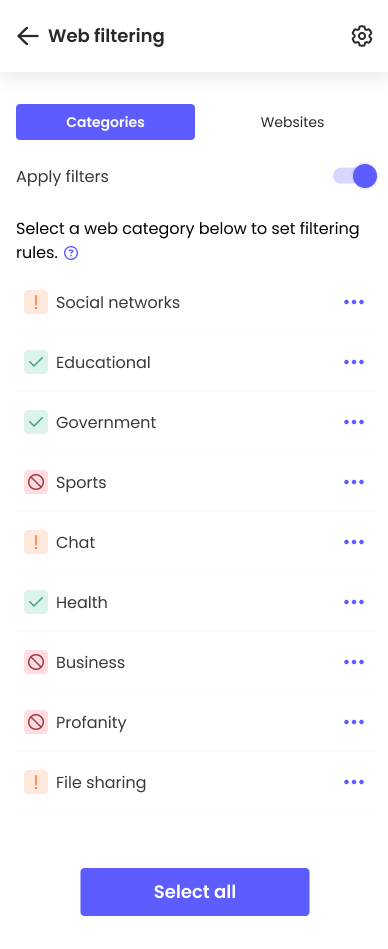
Qustodio allows parents to set screen time allowances for every day of the week, and also set time limits for individual apps – and use the in-built app monitoring and detection to automatically sort over 25,000 apps into categories for easier blocking or accessing.
It’s easy to create different routines and switch between them and, if you need to step in quickly, there’s an option to pause internet access on child devices or block the device completely.
And if parents want to reward their children or be a little more lenient, it’s easy to add screen time and see a new limit once that extra time has been granted.
Different rules can be used to govern screen time use between browsers and apps, there are varying “modes” that alter access for bedtime, leisure time and study time, and custom schedules are very easy to build.
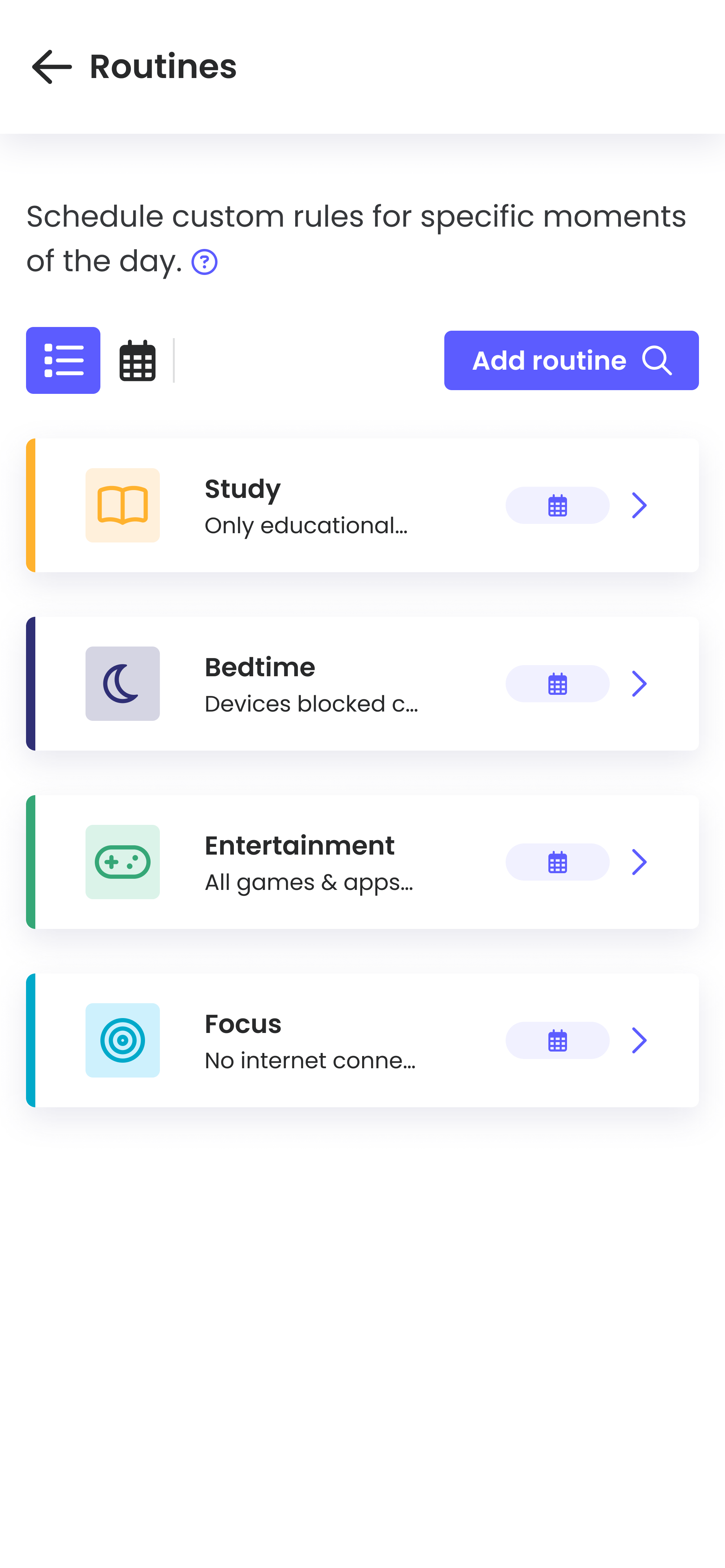
A straightforward map allows parents to spot child locations, geofencing is supported – albeit with a tiny 200m radius – and you can see location histories.
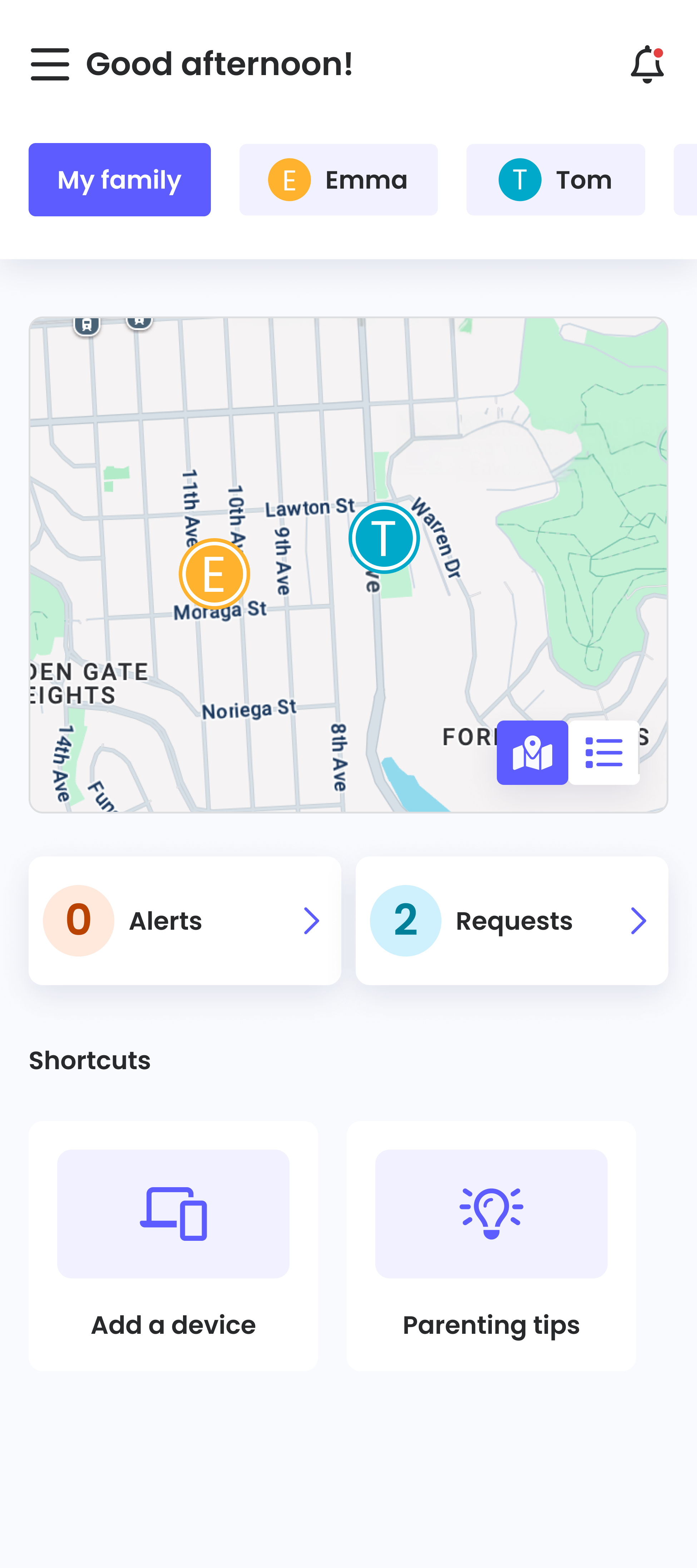
Call and SMS tracking and reading are supported on both Android and iOS, with full message details available, and parents can block phone numbers on child devices. You’ll get alerts for suspect content.

When it comes to reporting on all of this, Qustodio is similarly comprehensive. A real-time dashboard provides easy access to each child's digital activity, including an activity timeline, screen time and browsing history, and parents can access more detailed daily or weekly reports.
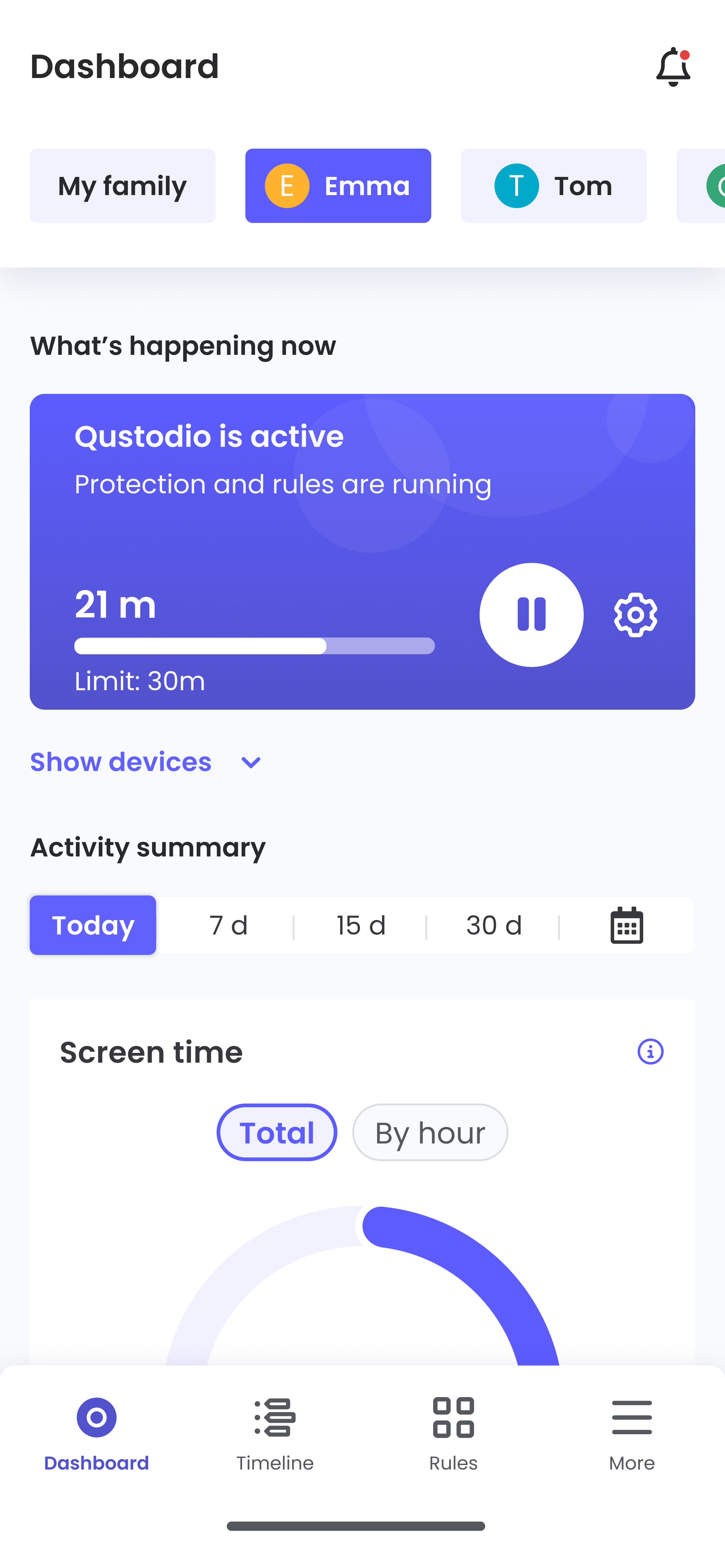
Qustodio is also forging ahead with some AI-based content, too, with AI-powered alerts that notify parents of any worrying searches, conversations or social media activity based on chosen topics or categories. That’s great, but it’s worth noting that Qustodio is a little weak on social media monitoring – it monitors messages on WhatsApp, Instagram and LINE, but that’s it.
In terms of other features, Qustodio allows parents to limit social media use, get app-based insights, and add additional parents or guardians to the software.
The app is also comprehensive when it comes to device support. As well as working on Android and iOS, which is a given for parental control apps these days, it works on Windows and Mac OS tech, Chromebooks, and Kindles. Additionally, parents can monitor child devices using Qustodio’s web interface.
As usual, though, be prepared that not every feature works on every platform. You don’t get WhatsApp alerts on iOS, for instance, and there’s no location, call or SMS monitoring on Mac OS or Windows. Android is the only platform that features a panic button.
Interface and in use
Qustodio has one of the best interfaces we’ve seen on any parental control app. As well as having a straightforward layout that places everything where you’d expect, Qustodio packs its apps and web interfaces with helpful tips and explanations about features and how they work.
A selection of Quick Actions provides fast access to common tasks, and the activity summary does a fantastic job of presenting key data in an attractive and intuitive format.
Child apps are simple enough for even the youngest children to understand what’s going on, and if you’re a parent who wants to dive deeper into the settings, you won’t get lost – the effective UI continues here.
It’s typically easy to get started, too: download the app, register an account, set up child profiles and tick all of the permissions, and you’re ready to start building schedules, monitoring devices and protecting your kids.
Customer Support
Qustodio makes a big deal about ensuring that its service is easy to use for busy parents who may not have a deep understanding of technology, and this attitude extends to its support functionality.
There are loads of helpful articles in the FAQ section, many of which have screenshots, and the guides that illustrate how to set up the app, use basic features and manage your account are particularly good.
If you need support and you use the Basic package, it’s managed through a contact form – sadly there’s no phone support, chatbot or live chat available here, but users report that they always receive helpful, polite form responses within 24 hours.
If you’re a Complete user, you get access to Care Plus. This adds phone support, personalized guidance and ongoing check-ins for parents who want more from their parental control app. And, impressively, Care Plus has an average resolution rate of 97% and an average resolution time of 15 minutes.
While it’s included for free with the Complete package, it costs $10.21/£7.99 to add it to the Basic product.
The Competition
As a big name in the parental control space, Qustodio has some big rivals – but it does a brilliant job of competing.
Norton Family, for instance, is more affordable than Qustodio but not as good at call or SMS monitoring. And MMGuardian isn’t as easy to use as Qustodio and is a bit more expensive, too.
Bark is probably Qustodio’s best competitor. It’s far better with social media, but is more limited on iOS and doesn’t provide a full web history, and it’s also a little more expensive.
Final Verdict
Those factors leave Qustodio looking like a particularly strong parental control option. It has superb filtering, scheduling and screen time options, AI-based additions, solid location features and excellent design, reporting and platform support.
Its customer support is great if you have the Complete product, the apps are all easy to use, and the pricing is fair, too – either competing or undercutting many rivals. The only downside is weak social media monitoring and a relatively small geofencing zone.
That social media monitoring drawback could be a dealbreaker for many families but, in almost every other area, Qustodio is a winner – it’s one of the best parental control apps on the market.
- We've also featured the best free parental control software
Mike has worked as a technology journalist for more than a decade and has written for most of the UK’s big technology titles alongside numerous global outlets. He loves PCs, laptops and any new hardware, and covers everything from the latest business trends to high-end gaming gear.
You must confirm your public display name before commenting
Please logout and then login again, you will then be prompted to enter your display name.
